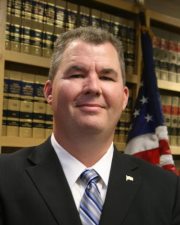
Deputy District Attorney Clinton Parish surprised many on Wednesday when he suddenly announced he would challenge the newest judge, Judge Daniel Maguire, appointed just last year by Governor Arnold Schwarzenegger.
“Yolo County deserves better than that,” he told the Sacramento Bee Wednesday. “It is time to get politics off the bench.”
“I’m an experienced courtroom prosecutor,” Mr. Parish told the Daily Democrat. “… My opponent is without that criminal experience.”
Judge Maguire told the Daily Democrat, in response, that his position was based on merits, not politics. In fact, Judge Maguire is well-respected and earns high marks from the bar association and his colleagues. He is a former President of the Yolo County Bar Association.
Most recently, he had a private practice in Davis where he handled mainly civil litigation.
“It is non-partisan,” Judge Maguire told the Daily Democrat. “… There is a judicial nomination evaluation by the state bar that evaluates the qualifications of each candidate.”
More interesting is the politics of this decision. Back in 2008, then-Deputy DA James Walker challenged Judge Fall and lost overwhelmingly. That decision created bad blood within the DA’s office and ultimately led Mr. Walker to leave the office for private practice.
However, Mr. Parish seems to have the backing of Yolo County’s law enforcement establishment, including the current and past DA’s who turned out to hear his announcement on the grass at noon Wednesday in front of the Courthouse.
The Daily Democrat reports that District Attorney Jeff Reisig and Sheriff Ed Prieto have both endorsed Parish.
The election would be in June 2012. Mr. Parish was hired by the Yolo County DA’s office back in 2002 and claims to have been part of at least 50 jury trials and prosecuted more than 1000 criminal cases.
The Bee reports he is a graduate of the McGeorge School of Law.
None of his cases were perhaps more prominent than the 2010 prosecution of Robert Ferguson. Mr. Ferguson, a career criminal, faced life in prison for stealing a $3.99 package of cheese – a case that drew national attention.
Mr. Parish played a crucial role in arguing for life in prison.
He argued that, given Mr. Ferguson’s long history of being in prison for a total of 22 years, he has not learned from his mistakes.
Mr. Parish told the court, “The people gave him another shot, yet here we are again… Simply put, this defendant is a career criminal.”
Mr. Parish pursued the matter, even in face of strong opposition from both the probation department and doctors, who had concluded that Mr. Ferguson was bipolar and had trouble controlling impulses to steal during manic phases.
While Mr. Ferguson had a long criminal history, many of his convictions were in the distant past, and the nature of the crimes were not violent in any way. No weapons or injuries were involved.
His only violent encounter was when he threw a coke bottle at his brother and received a misdemeanor assault conviction for it.
Eventually, Judge Warriner accepted the probation department’s recommendation to disregard the prior strikes, and he sentenced Mr. Ferguson to the longest term for petty theft with priors.
As a result, he received 7 years and 8 months in prison, for the crime of stealing a package of cheese.
Mr. Parish is also well known for his court room antics.
In one trial, the prosecutor grabbed the alleged weapon, a gun, pointed it over the heads of the jury and suddenly shouted, “What color are my shoes? What color are my shoes?” He was making the point that an officer who is being fired at may not correctly recall details of the event.
Deputy DA Clinton Parish likes to brag that he saves his best arguments for what is supposed to be the rebuttal closing argument – the argument that the DA gets due to the fact that they have the burden of proof in the case, when the defense attorney cannot respond.
In the trial of Ronnie Barahona, accused of attempting to murder two Sacramento Police Officers in West Sacramento, Mr. Parish did not disappoint. He attempted to counter the defendant’s claims of poverty, showing pictures of a neatly-organized garage, nice tools and a bright red hot-rod car.
He punctuated an explanation of the “kill zone” with a PowerPoint presentation that was accompanied by generic gunfire sound-effects that were blasted on his speakers at the jury.
In his final act, Mr. Parish told the jury to imagine it is Thanksgiving dinner and the story of this trial is being told to family. He relayed a story at breakneck pace that could have been out of the Fast and Furious. The story began with a man taking a blow torch to a Sacramento ATM, then culminated in a high-speed pursuit, tearing through the streets of Sacramento and then West Sacramento. It ended with a car hitting a fire hydrant and a foot chase, and with the man opening fire on the police.
Mr. Parish was dramatic in his presentation, delivering it rapidly, and he closed his story talking about how the man shot at the police, “bang,” and shot again “bang, bang,” and finally the fourth shot, “bang.”
Mr. Parish said, and your family turns to you and asks, what happened? “Nothing, he was shooting at the ground, we walked him.” He turned to the jury and said that this man is guilty of attempting to murder two police officers, please convict him.
While Mr. Parish’s closing remarks were long on drama and short on facts, indeed, the defendant had already admitted to the Sacramento-based crimes of theft and evading police. At the same time, the jury came remarkably close to, in essence, “walking” the defendant.
The jury would only convict the defendant of a single count of assault on a police officer, a conviction that would net the shooter nearly 29 years in prison.
The defense told the Vanguard that they had argued all along that it was a “Negligent Discharge,” arguing that he was firing into the ground attempting to dissuade the officers from pursuing him.
Courtroom theatrics are not the only calling card of Mr. Parish.
In one courtroom episode last year, Deputy DA Parish began complaining about the policy of converting fines to jail time. He argued that the county was hurting for revenue and needed to start collecting these fines rather than allowing the defendants to work them off with time served in jail.
Judge White quickly overruled him, arguing that the best thing for the county’s fiscal outlook was to get the individual rehabbed, and in a job where he could pay his taxes.
Worse yet, when a defendant was given a suspended sentence, he practically exploded.
“This has become a joke,” he said. “Suspended prison sentences are never imposed in this county and it has become a running joke.”
He then mocked the probationer’s claim that relapses happen. Judges bend over backwards not to impose them.
He then said the DA is no longer going to offer suspended sentences. And then he said, “When we stop offering suspended sentences, remember this day.”
Judge White responded forcefully, admonishing the Deputy DA that there are reasons why there is judicial discretion rather than the DA getting to impose whatever sentence they want. She said it was not appropriate to send the defendant to prison in this case. He is not a danger to the public. The family is willing to pay for treatment. She said that if it becomes necessary to impose the suspended sentence that time will come, but we are not there yet.
Mr. Parish has said that he has been interested in being a judge for several years.
“For years I made it known I wanted to be a judge someday,” Mr. Parish said as reported by the Sacramento Bee.
The question is really whether he has the right mentality and gravitas to do it.
—David M. Greenwald reporting





Seems to me that if both Jeff Reisig and Ed Prieto chimed in to support Parish, that’s good enough reason for me to vote for Judge Daniel Maguire!
Seems to me we, the lay public, ought not vote on judges, ever. Even worse, our voting for or against them forces judicial candidates to raise revenues for their campaigns, eroding (in my view) their independence and increasing the opportunity for corruption or the appearance of corruption.
My belief is that the governor (informed by his staff) is the best person to nominate judges. They should always have to pass a confirmation vote in the state senate. And they should be appointed only for a fixed term–something like 15 years in the case of a Superior Court judge. I think lifetime appointments are excessive. If a judge whose 15-year term has expired and he wants to stay on the job, he can appeal to the governor in office for a re-appointment at that time. Regardless, 15 years is plenty long enough.
I also don’t believe in recall elections for judges. I think, when questions of ethics or malfeasance in office come up, either a committee appointed by the legislature should look into it and recommend a proper course of action (including removal from office in an extreme case) or have a group within the state bar perform the same action and make its recommendation to the legislature.
I agree. There is a limited knowledge of Judges. Politicizing the judiciary is a mistake. And we have a process in place where there are screenings and evaluations before being appointed.
I guess I have to respectfully disagree. Judicial elections air the issues that impact the local courthouses. Look at how Attorney Parish’s declaration has already caused public discussion of how things are run in the courts. Judges should reflect in some degree the nature of the local county in which they serve. And, an election makes candidates get out there and talk with the community. It’s all a good thing. I look forward to the debates.
It is hard to believe that a man who tried to put someone away for life for stealing $3.99 worth of cheese has the qualifications to make the serious decisions required of a judge.
It is hard to believe that know-nothings like me, who don’t know much about a man who tried to put someone away for life for stealing $3.99 worth of cheese, who don’t know his technical expertise and don’t know his temperament, are expected to decide if he has the better qualifications to make the serious decisions required of a judge or if the other guy does. And then, once we have placed one or the other on the bench, it is hard to believe any of us in the unwashed masses will hold him accountable by following his daily actions as a judge.
I wish our system were far less Progressive. I wish we did not vote for any department heads at the county level, same as we don’t vote for department heads at the city level. I think the Supervisors could find good candidates for Public Guardian and Treasurer-Tax Collector and so on, and the Supes would be expected to make sure those officers they hired were doing a good job.
I generally think we the voters are expected to vote on too many things. I think for many voters who are busy with their everyday lives the expectation to follow 20 or more elected officials and then keep up with their campaigns and so on initimidates a great number of voters who feel themselves too uninformed. Those folks, I think, don’t vote at all because of our system of having to vote for too many offices, especially at the county and state levels.
[quote]It is hard to believe that a man who tried to put someone away for life for stealing $3.99 worth of cheese has the qualifications to make the serious decisions required of a judge.[/quote]
It’s no more difficult than believing a CA Chief Justice was booted…
In a life full of firsts, she added the dubious distinction of being the first Chief Justice of the California Supreme Court to be removed from that office by a majority of the state’s voters through a confirmation election.